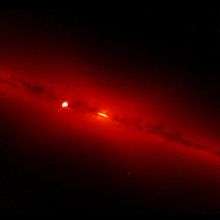NGC 4013
| NGC 4013 | |
|---|---|
|
HST closeup view of NGC 4013 | |
| Observation data (J2000 epoch) | |
| Constellation | Ursa Major |
| Right ascension | 11h 58m 31.13s[1] |
| Declination | +43° 56′ 50.1″[1] |
| Redshift | 831 ± 1 km/s[1] |
| Distance |
60.6 ± 8.1 Mly (18.6 ± 2.5 Mpc)[2] |
| Apparent magnitude (V) | 12.1B[1] |
| Characteristics | |
| Type | SBa[1] |
| Apparent size (V) | 5.2' x 1.0'[1] |
| Other designations | |
|
UGC 6963,[1] PGC 37691[1] LEDA 37691[3] 2MFGC 9412[3] IRAS 11559+4413[3] 2MASX J11583141+4356492[3] MCG+07-25-009[3] UZC J115831.5+435651[3] | |
NGC 4013 is an edge-on barred spiral galaxy about 55 million light-years away in the constellation Ursa Major. The disk of NGC 4013 shows a distinct "peanut"-shaped bulge in long exposure photographs that N-body computer simulations suggest is consistent with a stellar bar seen perpendicular to the line of sight.[4]

A recent deep color image of NGC 4013 revealed a looping tidal stream of stars extending over 80 thousand light-years from the Galactic Center. This structure is thought to be the remnants of a smaller galaxy that was torn apart by tidal forces as it collided with NGC 4013.[5]
Supernova SN 1989Z was discovered on December 30, 1989 at apparent magnitude 12.[6]
See also
References
- 1 2 3 4 5 6 7 8 "NASA/IPAC Extragalactic Database". Results for NGC 4013. Retrieved 2006-11-25.
- ↑ "Distance Results for NGC 4013". NASA/IPAC Extragalactic Database. Retrieved 2010-06-13.
- 1 2 3 4 5 6 "SIMBAD". Results for NGC 4013. Retrieved 2009-12-25.
- ↑ Combes, F. and Sanders, R.H., "Formation and properties of persisting stellar bars", Astronomy and Astrophysics, vol. 96, no. 1-2, Mar. 1981, p. 164-173.
- ↑ D. Martínez-Delgado (IAC); M. Pohlen (Cardiff); R. Jay GaBany (Blackbird Obs); S. Majewski (Univ Virginia); et al. (2009). "DISCOVERY OF A GIANT STELLAR TIDAL STREAM AROUND THE DISK GALAXY NGC 4013". Astrophysical Journal. 692 (2): 955–963. Bibcode:2009ApJ...692..955M. arXiv:0801.4657
 . doi:10.1088/0004-637X/692/2/955.
. doi:10.1088/0004-637X/692/2/955. - ↑ "List of Supernovae". Harvard-Smithsonian Center for Astrophysics (IAU). Retrieved 2010-07-14.
External links
| Wikimedia Commons has media related to NGC 4013. |
- The Discovery of a Giant Stellar Tidal Stream Around NGC4013
- HubbleSite NewsCenter: A Galaxy on the Edge
- NASA Astronomy Picture of the Day: NGC 4013 and the Tidal Stream (7 February 2008)
